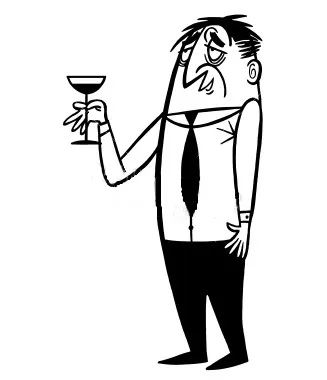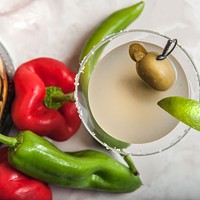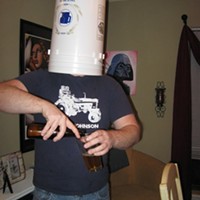Editor’s note: We recognize how quickly Charlotte has changed over the years, so here’s us trying to preserve its story. In this series, local author David Aaron Moore answers reader-submitted questions about unusual, noteworthy or historic people, places and things in Charlotte and the surrounding metro area. Submit inquires to davidaaronmoore@gmail.com.
Is it true that you weren’t able to buy drinks in a bar in Charlotte until the 1980s? — Xavier Greene, Pineville

Actually, by 1980, you could buy alcohol at a bar or a restaurant. But some laws changed around that time. If you were 18 and older, you could legally purchase beer and wine and get into a nightclub. Shortly thereafter, the age rose to 19. The age requirement continued to increase until the law required that you had to be at least 21 to purchase alcohol of any kind, or enter an establishment (other than a restaurant) that sold it.
Sounds needlessly complicated, huh? Not unlike the centuries-long argument over booze that has continued in this state since the late 1790s. But we’re not going back that far. Let’s jump ahead just over 100 years or so, to 1908. That year a group of tee-totaling do-gooders thought no one should be able to consume alcohol in the great state of North Carolina, so they initiated a statewide ban (with a resounding 62 percent of voters agreeing) 12 years before the U.S. instituted Prohibition.
On May 26, 1908, North Carolina became the 10th state in the country and the first state in the South (although there is some debate as to whether or not Mississippi can lay claim to that honor, by a matter of one day) to enact a statewide prohibition of alcoholic beverages.
Spurred by a group known as the Anti-Saloon League (ASL), the movement to ban alcohol here and across the country was reportedly driven by the wealthy and overzealous, who claimed to be disenchanted by the impact alcohol had on the impoverished.
A booklet printed by the ASL specifically for Charlotte, titled “A Second Mecklenburg Declaration of Independence,” declared itself a righteous and just representation of the city’s townspeople because of its roster of endorsees.
Here are a few quotes from the booklet:
From H.Q. Alexander, a doctor from Mecklenburg County: “Prohibition has made a marked improvement on the County. When the saloons were in Charlotte, Negroes and others would leave the city and on their way home drunk and curse to the annoyance of the good citizens. I have not seen a person drunk in the country since Prohibition has gone into effect.”
From J.S. Dixon: “I am a farmer in Steele Creek, and I can see a big improvement in the country since Prohibition went into effect. It was the best thing that ever happened for my section. Colored hands come home from Charlotte now sober with provisions and clothing instead of liquor and it has been a great improvement to our white citizens that drank.”
From L.H. Robinson, another farmer: “Prohibition has done more for Providence Township than for any ward in the City of Charlotte. It has been a great blessing to Providence Township. On Saturday the Negroes would get together and send to Charlotte for liquor, and on Sunday there would be regular rows. Now such conditions do not exist. When we send Negroes to Charlotte we have no fear like we once had, that they would come back drunk with something broken or unattended to.”
Charlotte and the rest of North Carolina had a big head start on most of the country when it came to alcohol deprivation. Regardless, neither state nor national efforts reduced the production of homebrew or illegal imports. According to one report, an estimated $15,000,000 in covert liquor transport and sales (approximately $150,000,000 today) came into the state from Richmond, Virginia, every year throughout Prohibition.
Although the Anti-Saloon League and upper-crust citizens were sure a lack of access to spirits would somehow curtail crime, it apparently had the opposite effect. According to a statement from the director of prohibition, “We have more illicit distilleries than any other state in the union, and the number is increasing.”
Not only was there an upswing in crime, the end result may have created a handful of minor celebrities.
Moonshiners and rum-runners, as they were frequently called, made a mint. Some of them souped-up their vehicles so they could outrun authorities attempting to enforce liquor laws. A few would become well-known race car drivers in the earliest days of NASCAR.
Thirteen years after nationwide Prohibition and 25 years after North Carolina’s prohibition law, President Franklin D. Roosevelt signed the 18th Amendment in March 1933, allowing the sale of beer and wine. Later that year, the 21st Amendment was passed, repealing Prohibition completely.
But North Carolina still wasn’t onboard. Although the state legislature voted in 1937 to allow alcohol sales, Charlotte and Mecklenburg County remained dry until 1947.
By September of that year, you could purchase liquor at the owned and operated state ABC stores, but you couldn’t get a drink at a bar.
Clever Charlotteans managed to get around that by creating private membership “locker clubs,” where patrons could bring their own liquor (in a “brown bag”) and purchase what was referred to as “a set up,” which generally included glasses, ice and your choice of mixers. This came to a screeching halt in March 1966, when a Charlotte judge fined a club owner and prompted a state Supreme Court judge to ban the practice. The General Assembly passed the “Burney Brown Bag” Bill, which made the practice officially legal the following year.
Still, fans of alcoholic spirits weren’t quite satisfied. In fact, they grew to despise the habit of carrying around a bottle in a bag. So, they continued to fight. They lost two more times.
By the early 1970s, North Carolina was the only Southern state where liquor by the drink wasn’t allowed to be sold. Spirited aficionados were armed and ready, but there was still heady resistance, largely in the form of a man named Henderson Belk (of the Belk retail store chain). He proclaimed that supporters risked the wrath of God, and pointed to Joseph Kennedy, who was an importer of scotch, citing the death of his eldest son Joe, the assassinations of his sons John and Robert, a plane crash Sen. Ted Kennedy survived and even Ted’s son Edward, who lost a leg to cancer, as proof. “You watch whoever’s involved in the campaign, and see what happens to them. When you violate the spiritual law of God, you pay the price.”
Ironically, then-Mayor John Belk, Henderson’s kin, supported the right for citizens to belly up to a bar.
On Sept. 8, 1978, Charlotte voters made it clear they agreed. The first over-the-bar drink was sold on Nov. 21, 1978.
David Aaron Moore is the author of Charlotte: Murder, Mystery and Mayhem.” His writings have appeared in numerous publications throughout the U.S. and Canada.



